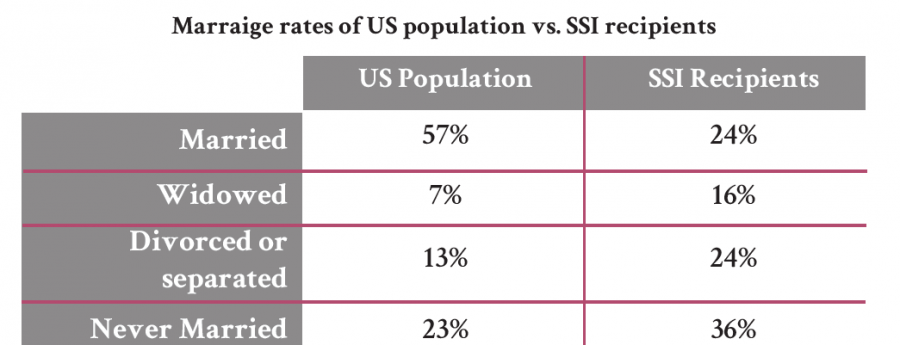Marriage equality for all! Well, except you…
September 27, 2020
I won’t deny that June 26, 2015 was a huge win for marriage equality. However, the war for marriage equality is far from over. In fact, for the last five years, there has been a battle cry from one of the most invisible minority groups in the United States: the disabled.
According to the Centers for Disease Control and Prevention, 61 million Americans live with a disability. So, you would think that there would be more awareness about the massive roadblock facing people with disabilities and marriage.
However, it isn’t widely known that there are 18 million disabled Americans who are on federal benefit programs that provide income and health insurance because they can’t work due to disabling health conditions or injuries.
My boyfriend is one of the 18 million, and we can’t get married because he is disabled. It’s not that we are legally unable to marry. But if we do marry, he will lose his income and the health insurance that keeps him alive and stable.
This “marriage penalty” is life altering, ranging from a 25% reduction in income to complete loss of income and health insurance. The Social Security Administration has several rules when determining whether someone is disabled.
Speaking from second-hand experience, it can take several years for an individual to jump through all the hoops to prove on a state and federal level that they are in fact disabled. Talk about adding insult to injury.
There are also two different programs that have separate eligibility requirements: Social Security Disability Insurance (SSDI) and Supplemental Security Income (SSI).
According to the Social Security Administration website, to qualify for SSDI you must have worked long enough and recently enough to be “insured.”
SSI, on the other hand, is a “needs based” program based on an applicant’s income and resources. The caveat to that is benefits for SSI are also determined on the applicant’s spouse’s income.
When two people with SSI income marry, their income of $783 per month is combined and then reduced to $1,175 per month, which ends up being about a 25% reduction.
When someone with SSI income marries someone who works, part of the spouse’s income is used to determine how much money the SSI recipient will get, which is usually a massive reduction or elimination of benefits.
Let’s say two people want to get married; one receives benefits from the SSI program, the other works a minimum wage job. Based on deeming rules published by the Social Security Administration, the SSI recipient’s income would be reduced to $37.50 per month if they were to marry. If the working spouse were making $14.00 an hour or more, the SSI recipient would lose all income and be kicked off health insurance.
This explains why the rate of marriages of disabled adults compared to all adults in the United States is so low.
“Just 24 percent of SSI recipients age 18 or older (1.5 million) are married, compared with 57 percent of all adults in the United States,” Richard Balkus and Susan Wilschke, both former Social Insurance Administrators for the Social Security Administration, found.
Disabled adults must choose between marriage and financial security.
Why are we forcing our fellow Americans to choose between the two? This is all because of an outdated policy that was thought up back when the government was positive that forced sterilization was the “cure” for disabilities.
It’s not like there are millions of Americans against changing this policy. The only reason this policy remains unchanged is because it is not widely known.
There is little wonder why this issue is little known. Most people like my boyfriend and I are terrified of the Social Security Administration and their rules and policies.
Not only will legal marriage affect his income, but the SSA also has the ability to determine that we are “holding out” to the community that we are married.
We have to be careful to never refer to each other as anything more than boyfriend/girlfriend, we have to correct people if they ever refer to one of us husband or wife to the other, we aren’t able to wear rings signifying that we are in a relationship and we will never be able to have a wedding or a commitment ceremony. All of this gets harder and harder the longer we are in a relationship.
We dream of the day that we are able to marry, as are millions of other disabled Americans, I am sure. We are closer than ever to a solution, but it still seems out of reach.
In March of 2019 a bill titled H.R.1529, or the “Marriage Access for People with Special Abilities Act” (MAPSA Act) was introduced in the House of Representatives. It would effectively remove the penalty and allow for eligibility to be based on an individual basis.
Unfortunately, the bill was referred to another committee and hasn’t had any further actions made on it, according to the bill history published on Congress.gov.
How do we fix this? Write letters to your senators and representatives letting them know that this is an issue that needs attention now! Find disability advocates who are trying to bring awareness to this issue and spread the word. Sign a petition on Change.org. Tell everyone you know about this issue. This penalty can only change if we all work together.


